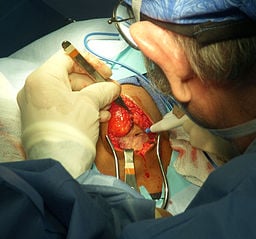From the Huffington Post (1):
“Police in Mexico’s western state of Michoacan detained an alleged member of the Knights Templar cartel who is suspected of kidnapping children to harvest their organs, an official said Monday.”
“Manuel Plancarte Gaspar was part of the cartel’s organ-trafficking ring. The ring would kidnap children and take them to rented homes with medical equipment where their organs were removed…”
Human trafficking is about more than just sex and labor. Evil has a way of snowballing, which is why illegal organ traders realize that child trafficking is a way of meeting the demand for human tissues that are purchased for medical and biomedical research purposes. This is also why I expressed concerned about a recent proposal in the Wall Street Journal about allowing an open market for kidney trading in the United States (2). My response is summarized as follows.
Two economists propose a plan in the Wall Street Journal about opening a legal market for paid kidney donors in America. This article discusses the caveats for creating an open market for legal kidney trading. Informed consent is no match for coercion and exploitation. The poorest of the poor in developing nations become and must cover collateral costs. [The full response can be accessed here (3).]
Another case of organ trafficking was just reported in Egypt. A former criminal court judge has been accused of working with organ traffickers and doctors at several hospitals to illegally sell organs (4). This has long been an international problem.
Illegal organ and tissue trading is why we need cost-effective biotechnology to detect the age, race, and gender of anonymous tissues that are sold for medical and research purposes. There are already DNA-based technologies used by law enforcement to determine the identity of blood and tissue samples at crime scenes (5). Like DNA testing technology, tissue identity technology must be cost-effective and relatively easy for current law enforcement agencies to adopt.
David H. Nguyen, Ph.D., is Editor-in-Chief of Cancer InCytes magazine. He studies the conceptual foundations for innovations in biotechnology for detecting the age, race, and gender of anonymous human tissues. He also studies the biological processes that link childhood trauma with the risk for developing cancer during adulthood.
References
1.) Olga R. Rodriquez. “Child Organ Harvesting And Trafficking-Linked Arrest Made In Mexico.” Huffington Post. March 18, 2014. Accessed March 18, 2014. [http://www.huffingtonpost.com/2014/03/17/child-organ-harvesting_n_4982854.html] 2.) Gary S. Becker and Julio J. Elias. “Cash for Kidneys: The Case for a Market for Organs.” Wall Street Journal, January 18, 2014. Accessed on January 18, 2014. [http://online.wsj.com/news/articles/SB10001424052702304149404579322560004817176] 3.) David H. Nguyen. “Response to: ‘Cash for Kidneys: The Case for a Market for Organs.'” Cancer InCytes Blog, January 19, 2014. [http://cancerincytes.blogspot.com/2014/01/response-to-cash-for-kidneys-case-for.html] 4.) Cairo Post Staff. “Hospital and Judge Charged With Organ Trafficking.” The Cairo Post, March 17, 2014. Accessed on March 17, 2014. [http://thecairopost.com/news/102551/news/hospital-and-judge-charged-with-organ-trafficking] 5.) Karen Norrgard. “Forensics, DNA Fingerprint, and CODIS.” Nature Education 1(1):35, 2008.[http://www.nature.com/scitable/topicpage/forensics-dna-fingerprinting-and-codis-736]Image is from Jclemens at Wikimedia Commons.
This article was originally posted on the Cancer InCytes magazine blog on March 18, 2014.

The thought of organ trafficking makes me physically sick. To simply sit and ponder over the thought that someone can kill another person or illegally steal their organs is disguising and unimaginable.
This is a topic which really interests me and reading up on other articles I realize that this problem is worldwide. The above mentioned ways to prevent drug trafficking are substantial and relevant. However, there is no complete way to stop organ trafficking, especially with those people who promote it.
There is an example of a refugee from Syria who sold his kidney for $5000. The broker who organised this received $2000 and it was reported that the trafficker told press that he has arranged 35 black market sales.
With examples like this how can organ trafficking really be stopped? If you had someone who was dear to you in need of a transplant and prices were to high and the waiting list was too long, would you let your loved one die? Or would you consider drug trafficking as a cheaper alternative?
Under the National Organ Transplant Act of 1984 (NOTA), any individual convicted of buying or selling human organs faces a five-year prison sentence and/or a hefty fine.
The occurrence of organ trafficking comes down to money and the unending greed of the human population. The person who needs the organ and cannot afford it, the person who makes money from selling the organ and the broker who simply earns money from organizing a deal.
We were all brought into this world to live and this often leads to illegal activities, such as organ trafficking, drug sales and human trafficking, in order to survive. With the harshness of the world today and increasing difficulty in survival it is impossible for these activities to simply be stopped.